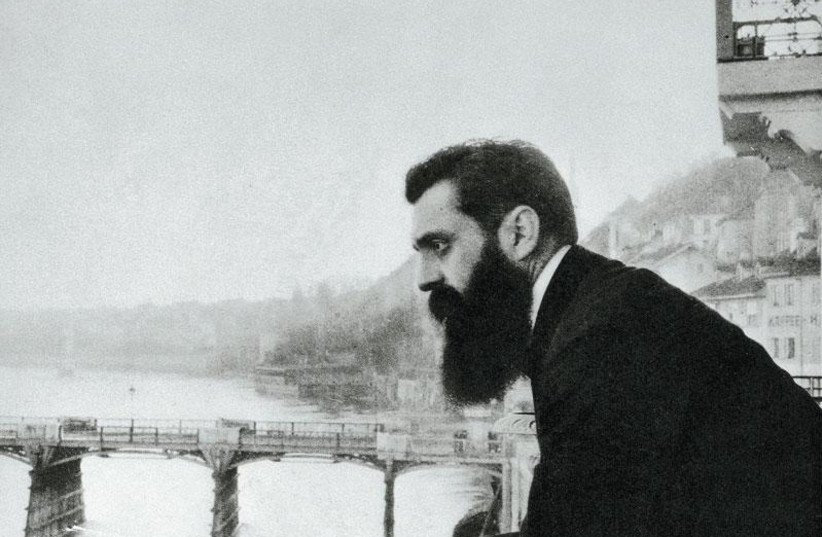The past and present danced together on Monday night in Basel, Switzerland. It wasn’t just due to the black-bearded, top-hatted Theodor Herzl impersonator, who gave stunningly relevant answers by quoting Herzl’s writings to questions about various contemporary issues today. It wasn’t just due to the moving appearance of the great-granddaughter of the falsely accused French army captain, Alfred Dreyfus, in the Stadt Casino where 208 delegates gathered 125 years ago in 1897 to launch the formal Zionist movement.
And it wasn’t just due to the brave speeches of various Swiss leaders who owned up to the ugly Swiss tradition of antisemitism – during Herzl’s and Hitler’s eras. The choreographer-in-chief that night, who harmonized the history of yesterday with the wonders of today before 1,400 people, was Israel’s president, Isaac Herzog.
Wisely speaking in Hebrew, even though much of the 125th anniversary of Herzl’s First Zionist Congress this week transpired in English, Herzog was at his best. The setting was sublime, oozing with Herzl’s essence, with the nervousness, excitement, and ultimately, the miraculous, epic transformations triggered by that one game-changing meeting decades ago in Basel. Using Herzl’s words, dreams and achievements as launching pads, Herzog challenged us all to reclaim Zionism. Zionism, he explained, was not an evolution but a revolution – a radical, brave, break from the past to save the Jewish people.
It was bold, modern and democratic, yet rooted in Jewish tradition. Ultimately, Herzog explained, Zionism’s greatest gift to the Jewish people was delivering independence after millennia of toxic dependence on others.
Keep dreaming and keep building
Today, when we are so used to Jewish independence, our challenge is to keep dreaming and keep building. Without being heavy-handed, without finger-pointing or guilt-tripping, and without being partisan, Herzog articulated a renewed liberal-democratic Herzlian vision of understanding that nationalism is the most effective vehicle for finding meaning in life individually and improving the world collectively. “Zionism,” Herzog explained, “is not just a shared fate, but a shared mission.”

THIS FORMULATION frees us from the Zionism of defense, of the III, the Israel Indignation Industry, forever either being furious from the Left about what Israel did, or furious from the Right about what the Left said about what Israel did. It frees us from the Zionism of the BBB, the Burnt-out Bureaucrats’ Barbecue, with drained Israeli politicians draining the Jewish people’s budget and energies with their cushy jobs. And it frees us from the Zionism of the NNN, the Nattering Nostalgic Nudniks, who are so focused on the lovely Zionism of yesteryear that they forget we need a robust, relevant Zionism today, too.
Instead, the notion of “shared mission” embraces Zionism as a process, a spark plug, a value. It means that Zionism is not frozen in the past nor super-defensive about the present. Instead, Zionism involves brainstorming, imagining, analyzing, thinking, and doing whatever it takes to help make Israel better, to help make the Jewish people better, to help make the world better, and to help make the next generation of Jews better understand what they are giving up if they abandon Judaism and the Jewish people.
Noting today’s painful divisions in Israel and throughout the Jewish world, Herzog echoed Herzl’s invitation for the Jewish people to work “together.” Herzl’s call for unity but not uniformity, his inspiring example of being a doer and a dreamer, his understanding that all people need a purpose and that the Jewish people must fight off our enemies while embracing one another and our values, should still be marching orders today. In fact, Herzl branded the First Zionist Congress, “the Jewish People on the march.”
Those of us who attended this 125th anniversary celebration of the first Zionist Congress felt the Jewish people on the march when we gave a standing ovation to the heart and soul of the Jewish people, Miriam Peretz.
Summarizing her heartbreaking story of losing two sons as soldiers, she described the anguish she feels every time she visits Mount Herzl, and doesn’t know “which grave I should hug first… No mother should have to make such a choice,” she said, while explaining her more difficult and inspiring choice – to live! “My choice to live is the victory over my enemies,” precisely because these terrorists, North and South, wanted to steal her life away from her, hoping to imprison her – and all of us – in grief and fear.
We gave a standing ovation to my new friend Ahmed Obaid Almansoori of Dubai, who, in flowing white robes, declared that “until antisemitism ends, there will be no peace.” And we gave a standing ovation to the new head of the Jewish Agency, Doron Almog, who captured Zionism’s bitzuist (get things done!) spirit by telling the poignant story of how he and his wife sought more empathetic care for his special needs son. “So,” he said so matter-of-factly, “we built a village.”
In the real world, functional democratic states are hard to find, grieving mothers are often paralyzed with pain, and villages don’t get built easily. But that’s the catalytic power of the Jewish tradition and the Zionist idea which we have tapped – from Herzl to Herzog.
True, the conference suffered occasionally from “Jewish-Conferencitis” with trial by sound bite on rushed, overstuffed panels that smothered thought rather than triggering it. But this conference was suffused in tradition, and energized by the opportunity to look back at how far we have come, while thinking ahead about all we still can do, tomorrow.
The writer is the editor of the new three-volume set Theodor Herzl: Zionist Writings, the inaugural publication of The Library of the Jewish People (www.theljp.org).
